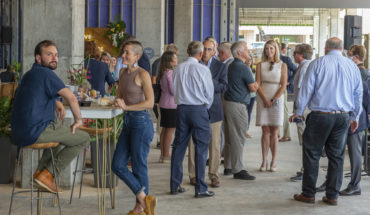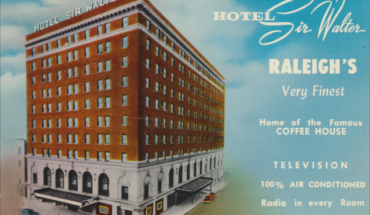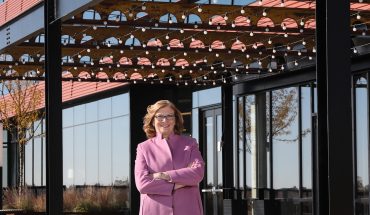The new decade will bring lots of change to our city, including a new mayor and City Council. We talked with Mayor Mary-Ann Baldwin on how she’ll tackle city issues while still serving as Executive Director of the Holt Brothers Foundation.
Written by Catherine Currin | Photography by Gus Samarco
The new decade will bring lots of change to our city, including a new mayor and City Council. We talked with Mayor Mary-Ann Baldwin, who will tackle city issues while still serving as Executive Director of the Holt Brothers Foundation, an organization that supports children who have a parent with cancer. The dynamic leader says she’s ready for the challenge: from scooters and Airbnbs (“low hanging fruit,” as she calls them) to the more pressing issues of affordable housing and transportation.
Have you always lived in Raleigh?
I moved here 30 years ago, and came for the same reason everyone else does—we couldn’t afford to live in New York.Weather, schools and quality of life all sold us on Raleigh.
In a nutshell, tell me how you feel Raleigh has changed.
There are non-chain restaurants, it’s awesome! The food is great! We used to go to Durham for restaurants, and now we have an established food scene. Our greenway has really grown up, and parks are another big change, and of course our downtown. The streets used to be empty, and now we have a vibrant downtown with lots of things to do. We’ve become a city.
Will you continue in your role at the Holt Brothers Foundation?
Charles Meeker had given me some good advice about how to compartmentalize when I joined City Council. And I did a pretty good job of that. When I first talked to Terrence and Torry [Holt] about running for mayor, they asked, “Well, can you do both?” And I asked them, “Did I miss a beat when I was on City Council?” They said no. I’m the kind of person who will stay up until midnight to get my job done. That’s just how it will be. The foundation really fills my soul.
How did you get into politics?
I was involved in my first political campaign when I was 15, for presidential candidate George McGovern. Then I was involved in another campaign for mayor. I was hooked on politics. My dad—he was a gadfly before I knew what that was—he used to write our congressmen and senators pretty much every other week. I grew up in a household with a very political, outspoken dad, who made me realize that working and making a difference, being involved and voting, were so important to who we are. That was ingrained in me. Then I went into journalism, and that was really about making a difference as well. After I moved here, I started getting involved in different campaigns, hosting events—I can’t tell you how many doors I’ve knocked on and canvassed. I was much more comfortable doing that, behind the scenes for others, than I was actually running for office. I never saw myself running for office. I first ran in 2007—but I met with 50 people before I decided to run. Once I became not fearful of losing, I just decided I was going to do it. I decided if I won, I won. And I if I lost, I still won. There’s a statistic that women have to be asked to run seven times before considering it.
I had to be asked 50 times.
In an interview, you mentioned finding a balance between preserving Raleigh’s history and its new development. How do you hope to achieve this?
We have done a good job of preserving parts of our downtown. If you walk down Fayetteville Street, you see Briggs Hardware, you see Boylan Pearce. There are old historic buildings next door to new towers. We have this nice mix of old and new. One of the ways of preserving that is by building more density in areas and corridors like Capital Boulevard and New Bern Avenue that can support our growth. The west side is a great example—lots of old warehouses mixed with new development.
How will your mayoral term differ from Nancy Mcfarlane’s? Did she give you any advice?
I think we share similar values. I think the difference will be style. I’m very direct, I’m hard-charging. I’m going to say what I think. Sometimes it’s not always the answer people want to hear, but it’s the answer. She gave me some advice that Charles Meeker gave her about managing your time—show up but don’t overdo it, and take some time for yourself. You can’t care for the city if you’re not caring for youself.
What are you most excited about being mayor?
First off, I’m excited that I have a new council to work with, young people who are very energized. In my conversationns with them, I can tell they are there for the right reasons. I tease them that my biggest challenge is going to be reigning them back—but I’d rather that then having to push them forward. We had a meeting in mid-December on housing affordability, and we think this is the most important issue we face. I’m excited to get started with that, because it can make a huge difference in our community.
This interview has been lightly edited for clarity and space.




